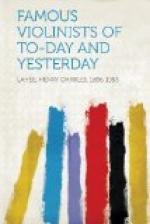Felice Giardini, another pupil of Somis, was born at Turin and became one of the foremost violinists in Europe. In 1750 he went to England where he made his first appearance at a benefit concert for Cuzzoni, the celebrated opera singer, then in the sere and yellow leaf of her career. His performance was so brilliant that he became established as the best violinist who had yet appeared in England, and in 1754 he was placed at the head of the opera orchestra, succeeding Festing. Soon afterwards he joined with the singer Mingotti in the management of opera, but the attempt was not a financial success. Notwithstanding his excellence as a performer and composer and the fine appointment which he held, Giardini died in abject poverty at Moscow, to which place he had gone after finding himself superseded in England by newcomers.
Among the pupils of Tartini the most eminent was Pietro Nardini, who was born at Fibiano, a village of Tuscany, in 1722. He became solo violinist at the court of Stuttgart and remained there fifteen years. In 1767 he went to Leghorn for a short time, and then returned to Padua, where he remained with his old master Tartini until the latter’s death, when he was appointed director of music to the court of the Duke of Tuscany, in whose service he remained many years.
Of his playing, Leopold Mozart, himself an eminent violinist, writes: “The beauty, purity and equality of his tone, and the tastefulness of his cantabile playing, cannot be surpassed; but he does not execute great difficulties.” His compositions are marked by vivacity, grace, and sweet sentimentality, but he has neither the depth of feeling, the grand pathos, nor the concentrated energy of his master Tartini.
Antonio Lolli, who was born at Bergamo about 1730, appears to have been somewhat of a charlatan. He was self-taught, and, though a performer of a good deal of brilliancy, was but a poor musician. He was restless, vain, and conceited, and addicted to gambling. He is said to have played the most difficult double-stops, octaves, tenths, double-shakes in thirds and sixths, harmonics, etc., with the greatest ease and certainty. At one time he appeared as a rival of Nardini, with whom he is said to have had a contest, and whom he is supposed to have defeated. According to some accounts, he managed to excite such universal admiration in advance of the contest that Nardini withdrew.
Lolli was so eccentric that he was considered by many people to be insane, and Doctor Burney, in writing of him, says, “I am convinced that in his lucid intervals, he was in a serious style a very great, expressive, and admirable performer;” but Doctor Burney does not mention any lucid interval.




